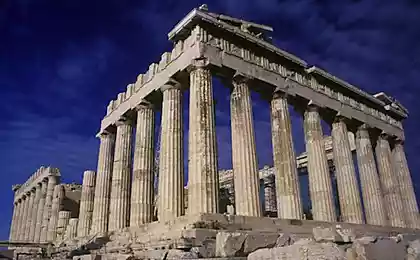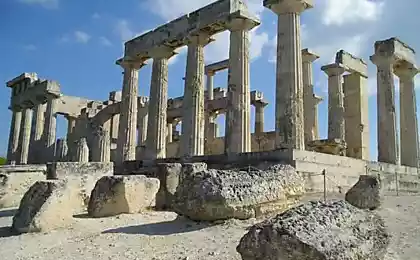746
16 phrases and expressions that shock originates from the myths of ancient Greece to the twenty-first century.
It is often possible to observe how people from different backgrounds and of different ages diluted his speech known phrases and expressions. For example: "This sofa is already on its last legs breathe! We will soon have to buy a new one. " Or: "My neighbor from the first floor from morning to evening wash up bones all who live in our entrance." However, in order to pass a truly educated man, not only to use the apt expression to the place. Best of all, if you know not only their meaning but also the origin!

1. Augean stables
Legend has it that King Augeas was an avid horse-breeder, in the stables which stood more than 3000 horses. However, for some reason, 30 years stables no one has ever cleaned. One of the labors of Hercules was that he cleaned the stables of Augeas the king. To do this, the hero took a horse stall in the riverbed Alpheus and the flow of water washed all the manure. Since then, the phrase "the Augean stables" is applied to all running or contamination to the breaking point.
2. Pour on the first number
In the old days, students of the school used to be flogged. Some were flogged for the cause, the other - for prevention. It was not unusual, and so that the student got it especially hard. In this case, it could release any further defect, until the first of next month.
3. Blue Blood
The Spanish royal family and the nobility were proud to trace their ancestry back to the Visigoths and never mingled with the Moors, penetrated into Spain from Africa (as opposed to the common people). As commoners were dark, while the nobility pale skin stood out blue veins, they were proud of this color and proudly called themselves "blue blood." Today this expression used to refer to the aristocracy.
4. Money does not smell
One day the son of the Roman emperor Vespasian chided his father in the introduction of taxes on public toilets. Then the emperor showed him received from this tax money, and asked whether they smell. Son gave a negative answer. So there was the phrase "money does not smell».

5. Reach Handle
In Russia cakes baked with a pen, for which they were worn. After the loaf put on the table, the handle broke off and, for reasons of hygiene, discarded. These pens are picked and ate beggars and dogs. Hence came the expression "to reach the hands" - that is, fail, fall.
6. Moribund
According to Christian tradition, the man who had long to live, the priest confessed, communion and incense censers around. As a result, to designate human disease (as in the modern language is barely working and device) was fixed expression "moribund».
7. The game is not worth the candle
At a time when there was no electricity, gamblers often gathered to play in the evening and used as a lighting candle. It often happens, the stakes and prize winners were so small that they do not pay off even candles. Hence was born the expression "not worth the trouble».
8. For sure
To have survived the lists of criminal jargon XVIII-XIX centuries, in which the expression "to drink" means a synonym for the word "poison". At that time, poisoning was considered one of the most reliable and safe ways to get rid of the killer interfering person.
9. Scapegoat
According to the Hebrew rite, on the day of the remission of sins the high priest laid his hands on the head of a goat and thereby laid on him the sins of the people. From here went the phrase "scapegoat».
10. Casting pearls before swine
The process of throwing small pieces of glass in front of pigs - a senseless idea really. But in the original text of the Bible (and taken from the phrase) refers to people who drop in feeder pigs a precious pearl. The fact is that once the word "gem", "beads" and "Pearl" is meant various types of pearls. And only then, with the development of industry, glass beads began to be called a beautiful word "beads».
11. On the moon
The Greek philosopher Aristotle (384-322. BC. E.) In the book "On the Heavens" suggests that the sky is made up of seven fixed crystal spheres, which approved the stars and planets. Also, the seven heavens mentioned in various places of the Koran: for example, states that the Quran itself was brought by an angel from the seventh heaven.
12. Wash up bones
According to the beliefs of some people, every unrepentant sinner, if over it gravitates curse after death comes from the grave as a vampire or a vampire and destroys people. To break the spell, you need to dig up the remains of the deceased and wash his bones clean water. Today, the term "wash up bones" refers to the analysis of a person's character.
13. Last warning
In 1958, the Chinese government was extremely outraged that the US air force and navy support Taiwan, and published his angry note titled "The Last Warning". The world shuddered with horror and held his breath in anticipation of the Third World. When seven years later, China has four published a note under the same name, the world howled with delight. Since, in addition to pieces of paper with the terrible words, China had nothing to oppose US, Taiwan still retained independence, which, by the way, Beijing did not recognize until now.

14. After us the deluge
This phrase is attributed to the French King Louis XV, but the memoirs claim that it belongs to the mistress of the king, the Marquise de Pompadour (1721-1764). She said it in 1757, to comfort the king, dejected defeat of French forces at Rossbach. It is possible that this phrase - an echo of the verse of an unknown Greek poet, who is often quoted Cicero and Seneca: "After my death, let the world perish in the fire».
15. With a twist
The image highlights - some little tidbits, which gives a sense of the severity and unusual - gave us personally Leo Tolstoy. It was he who first coined the phrase "a woman with a twist." In his drama "The Living Corpse" one character says to another: "My wife was the perfect woman ... But what do you say? There were highlights - you know, in kvass highlight? - There was no play in life ».
16. Make Self
The term came into our vocabulary is not so long ago - in the late 2000s - early 2010s. Indicates the kind of self-portrait, a person impresses on the camera itself. Self is most often done at arm's length, holding the device, so all the images in the photo have a distinctive perspective and composition - at an angle, just above or below the head.
And what expression you use in your speech? Share this article with your friends. It's really interesting!
via takprosto cc

1. Augean stables
Legend has it that King Augeas was an avid horse-breeder, in the stables which stood more than 3000 horses. However, for some reason, 30 years stables no one has ever cleaned. One of the labors of Hercules was that he cleaned the stables of Augeas the king. To do this, the hero took a horse stall in the riverbed Alpheus and the flow of water washed all the manure. Since then, the phrase "the Augean stables" is applied to all running or contamination to the breaking point.
2. Pour on the first number
In the old days, students of the school used to be flogged. Some were flogged for the cause, the other - for prevention. It was not unusual, and so that the student got it especially hard. In this case, it could release any further defect, until the first of next month.
3. Blue Blood
The Spanish royal family and the nobility were proud to trace their ancestry back to the Visigoths and never mingled with the Moors, penetrated into Spain from Africa (as opposed to the common people). As commoners were dark, while the nobility pale skin stood out blue veins, they were proud of this color and proudly called themselves "blue blood." Today this expression used to refer to the aristocracy.
4. Money does not smell
One day the son of the Roman emperor Vespasian chided his father in the introduction of taxes on public toilets. Then the emperor showed him received from this tax money, and asked whether they smell. Son gave a negative answer. So there was the phrase "money does not smell».

5. Reach Handle
In Russia cakes baked with a pen, for which they were worn. After the loaf put on the table, the handle broke off and, for reasons of hygiene, discarded. These pens are picked and ate beggars and dogs. Hence came the expression "to reach the hands" - that is, fail, fall.
6. Moribund
According to Christian tradition, the man who had long to live, the priest confessed, communion and incense censers around. As a result, to designate human disease (as in the modern language is barely working and device) was fixed expression "moribund».
7. The game is not worth the candle
At a time when there was no electricity, gamblers often gathered to play in the evening and used as a lighting candle. It often happens, the stakes and prize winners were so small that they do not pay off even candles. Hence was born the expression "not worth the trouble».
8. For sure
To have survived the lists of criminal jargon XVIII-XIX centuries, in which the expression "to drink" means a synonym for the word "poison". At that time, poisoning was considered one of the most reliable and safe ways to get rid of the killer interfering person.
9. Scapegoat
According to the Hebrew rite, on the day of the remission of sins the high priest laid his hands on the head of a goat and thereby laid on him the sins of the people. From here went the phrase "scapegoat».
10. Casting pearls before swine
The process of throwing small pieces of glass in front of pigs - a senseless idea really. But in the original text of the Bible (and taken from the phrase) refers to people who drop in feeder pigs a precious pearl. The fact is that once the word "gem", "beads" and "Pearl" is meant various types of pearls. And only then, with the development of industry, glass beads began to be called a beautiful word "beads».
11. On the moon
The Greek philosopher Aristotle (384-322. BC. E.) In the book "On the Heavens" suggests that the sky is made up of seven fixed crystal spheres, which approved the stars and planets. Also, the seven heavens mentioned in various places of the Koran: for example, states that the Quran itself was brought by an angel from the seventh heaven.
12. Wash up bones
According to the beliefs of some people, every unrepentant sinner, if over it gravitates curse after death comes from the grave as a vampire or a vampire and destroys people. To break the spell, you need to dig up the remains of the deceased and wash his bones clean water. Today, the term "wash up bones" refers to the analysis of a person's character.
13. Last warning
In 1958, the Chinese government was extremely outraged that the US air force and navy support Taiwan, and published his angry note titled "The Last Warning". The world shuddered with horror and held his breath in anticipation of the Third World. When seven years later, China has four published a note under the same name, the world howled with delight. Since, in addition to pieces of paper with the terrible words, China had nothing to oppose US, Taiwan still retained independence, which, by the way, Beijing did not recognize until now.

14. After us the deluge
This phrase is attributed to the French King Louis XV, but the memoirs claim that it belongs to the mistress of the king, the Marquise de Pompadour (1721-1764). She said it in 1757, to comfort the king, dejected defeat of French forces at Rossbach. It is possible that this phrase - an echo of the verse of an unknown Greek poet, who is often quoted Cicero and Seneca: "After my death, let the world perish in the fire».
15. With a twist
The image highlights - some little tidbits, which gives a sense of the severity and unusual - gave us personally Leo Tolstoy. It was he who first coined the phrase "a woman with a twist." In his drama "The Living Corpse" one character says to another: "My wife was the perfect woman ... But what do you say? There were highlights - you know, in kvass highlight? - There was no play in life ».
16. Make Self
The term came into our vocabulary is not so long ago - in the late 2000s - early 2010s. Indicates the kind of self-portrait, a person impresses on the camera itself. Self is most often done at arm's length, holding the device, so all the images in the photo have a distinctive perspective and composition - at an angle, just above or below the head.
And what expression you use in your speech? Share this article with your friends. It's really interesting!
via takprosto cc
30 examples of what a balcony - the best place in the apartment. And rightly so!
Wow: 13 pictures of women who have changed their shape better.























